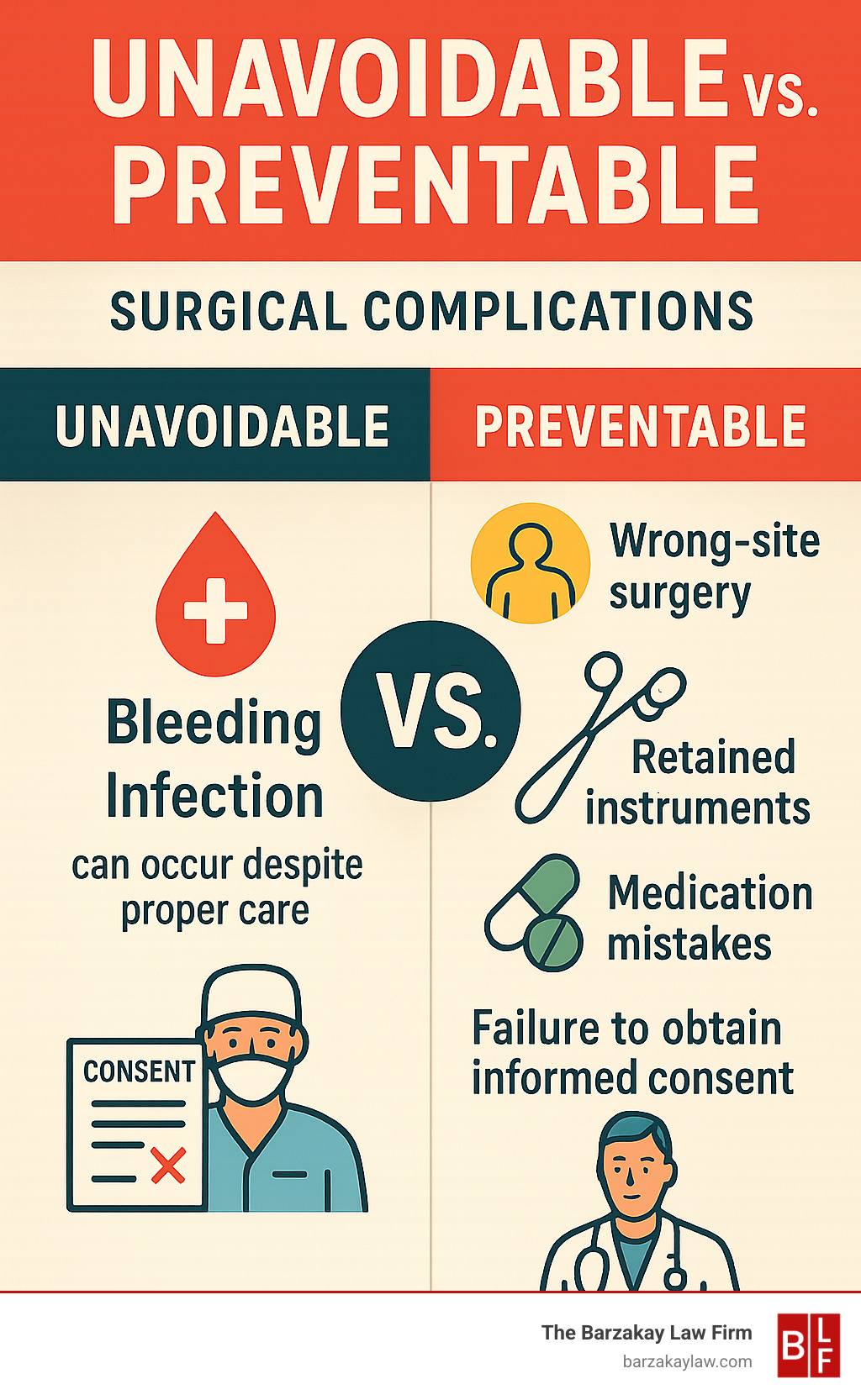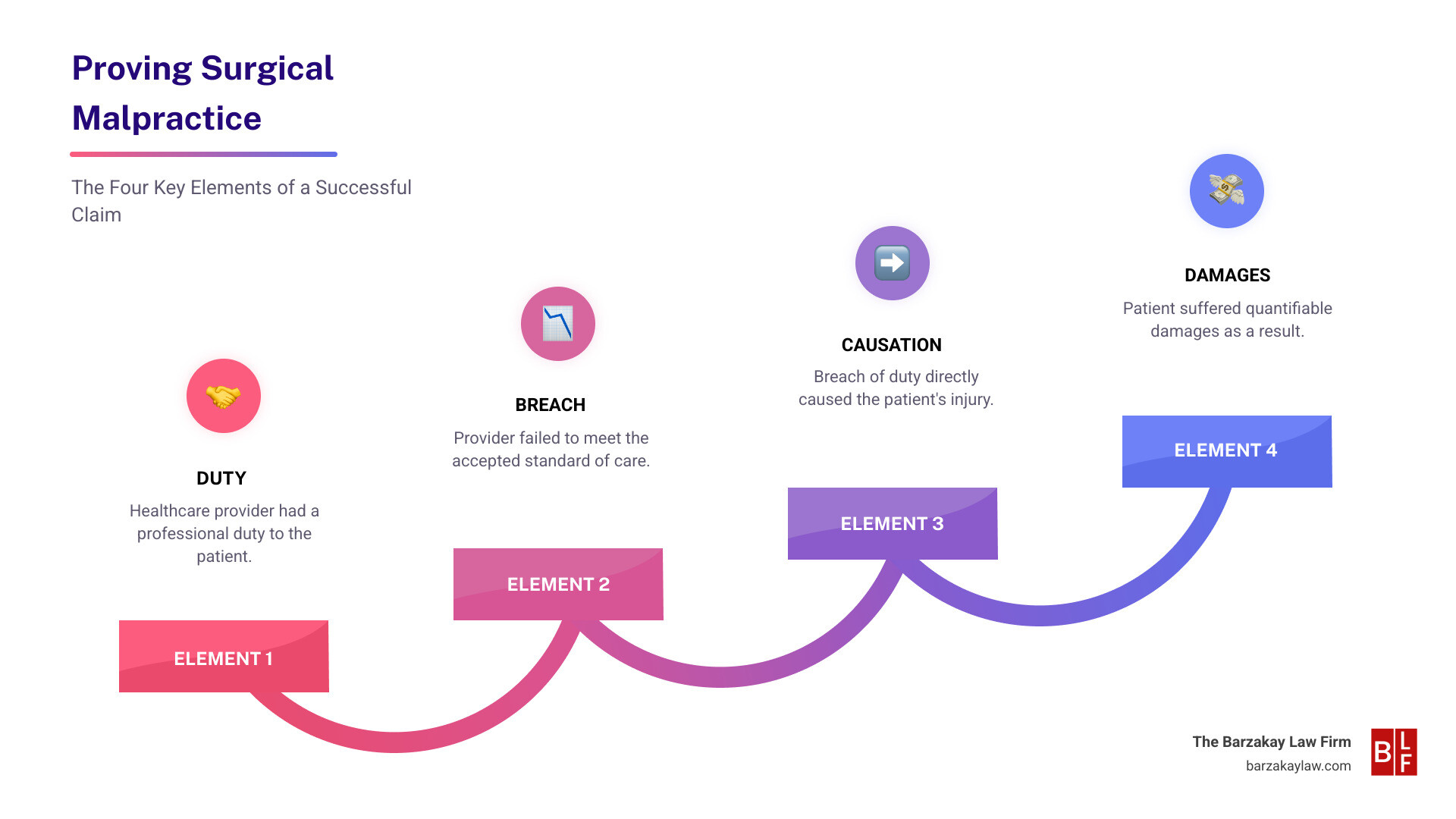Why Understanding Surgical Errors Matters for Your Legal Rights
When you need a surgical malpractice lawyer, you’re likely dealing with a preventable medical error that caused serious harm. Here’s what you need to know:
Key Reasons to Consult a Surgical Malpractice Lawyer:
- Wrong-site surgery – Operating on the wrong body part or location
- Retained surgical instruments – Leaving tools or sponges inside your body
- Anesthesia errors – Incorrect dosing or monitoring failures
- Post-operative infections – Due to improper sterilization or care
- Nerve or organ damage – From poor surgical technique or negligence
What Makes a Valid Case:
- The surgeon failed to meet accepted medical standards
- This failure directly caused your injury
- You suffered damages as a result
Surgery carries inherent risks, but not all complications are acceptable. As one legal source notes, “surgeries are inherently risky medical procedures during which patients put their lives in doctors’ hands.” However, there’s a critical difference between unavoidable complications and preventable errors.
The reality is sobering: surgical errors happen thousands of times each year in hospitals across the United States. These mistakes can lead to permanent disability, disfigurement, additional surgeries, or even death.
If you’re in South Florida – whether in Hollywood, Miami, or Boca Raton – and believe you’ve suffered from surgical negligence, understanding your rights is the first step toward justice. The legal system provides a path to compensation, but proving surgical malpractice requires navigating complex medical and legal standards.
Understanding Surgical Malpractice: When a Mistake Becomes Negligence
Medical malpractice occurs when a healthcare practitioner fails to meet the accepted standard of care. When this happens during surgery and injures a patient, it is surgical malpractice. This isn’t just an unexpected outcome or a known risk of surgery. It is a preventable mistake caused by a breach in the standard of care by the surgical team, which directly leads to harm.
We understand that surgeries inherently carry risks, and patients sign consent forms acknowledging potential complications. However, a known complication is an adverse event that can occur despite proper care, whereas a surgical error is a preventable mistake. This distinction is paramount. A bad outcome does not automatically mean there was malpractice. We must prove that the adverse outcome was due to negligence.
To build a viable surgical malpractice case, we focus on establishing four key elements:
- Duty: The healthcare provider had a professional duty to the patient.
- Breach: The provider breached that duty by failing to meet the accepted standard of care.
- Causation: This breach directly caused the patient’s injury.
- Damages: The patient suffered quantifiable damages as a result of the injury.
What is the “Standard of Care”?
The “standard of care” is the cornerstone of a medical malpractice claim. It is the level of care that a reasonably competent healthcare professional, with similar training, would have provided under similar circumstances. It’s not about perfection, but about following accepted medical practices. In Florida, establishing this standard often requires testimony from other medical professionals in the same field to show that the surgeon’s conduct fell below this accepted level and caused the patient’s injury.
Common Causes of Surgical Errors
Surgical errors are often complex, but understanding their causes is crucial for identifying negligence. Common reasons include:
- Inadequate Pre-Surgery Planning: Failure to review a patient’s history, misinterpreting tests, or lacking a clear surgical plan.
- Surgeon Fatigue: Exhaustion from long hours can impair judgment and reaction times, increasing the risk of mistakes.
- Miscommunication: Breakdowns in communication among the surgical team can lead to critical errors.
- Incompetence: A surgeon may lack the necessary skill or up-to-date knowledge for a specific procedure.
- Neglect: Failure to properly monitor a patient, address warning signs, or provide appropriate post-operative care.
- Surgeons Under the Influence of Drugs or Alcohol: Though rare and illegal, instances of impaired healthcare professionals can lead to devastating consequences.
Common Surgical Errors and Their Devastating Consequences
When you trust a surgeon, you expect them to follow proper procedures. Unfortunately, preventable surgical errors happen more often than people realize, with life-changing consequences.
Some of the most shocking errors include wrong-site surgery, where a surgeon operates on the wrong body part, or wrong-patient surgery, where the team operates on the wrong person entirely.
Anesthesia errors represent another serious category. An incorrect dose, failure to monitor vital signs, or using the wrong medication can lead to waking up during surgery, brain damage, or death.
One of the most preventable mistakes is retained surgical instruments, where sponges, clamps, or other tools are left inside a patient’s body. These foreign objects can cause severe infections, chronic pain, and require additional surgeries.
Post-operative infections can result from negligent practices like improper sterilization of instruments, poor hygiene, or inadequate wound care. While some infections are unavoidable, many are preventable.
Injuries Resulting from Surgical Malpractice
The physical and emotional toll of surgical errors is immense. Patients often face a long and difficult road to recovery.
Nerve damage can leave patients with chronic pain, numbness, or paralysis, sometimes from what should have been a routine procedure.
Organ perforation occurs when surgeons accidentally puncture organs like the bowel or bladder, causing internal bleeding and life-threatening infections.
Many victims face permanent disability, changing their quality of life and ability to work or care for themselves.
Disfigurement from surgical errors creates both physical and emotional scars that may require reconstructive procedures.
Severe infections can progress to sepsis, a life-threatening condition where the body’s immune response damages its own organs, leading to organ failure and death.
In cases involving anesthesia mistakes or severe blood loss, patients may suffer brain injuries that result in cognitive impairments or memory problems.
Tragically, the most severe surgical errors result in wrongful death, leaving families in South Florida to cope with a preventable loss.
If you’re dealing with these consequences in Hollywood, Miami, or anywhere in South Florida, a surgical malpractice lawyer can help you understand your rights.
Building Your Case: How a Surgical Malpractice Lawyer Can Help
Proving what went wrong after a surgical error can feel overwhelming. Surgical malpractice cases are challenging, requiring a deep dive into complex medical records and protocols to stand up against well-funded medical institutions. This is where a dedicated surgical malpractice lawyer becomes your strong advocate.
We start with evidence gathering, collecting every document related to your surgery—from surgical notes and anesthesia logs to nursing charts and diagnostic images. This medical records review is done alongside medical professionals who can identify signs of negligence that may not be obvious to an untrained eye.
The heart of your case is proving the four elements of negligence: duty, breach, causation, and damages. Each element must be supported by clear evidence.
One of the most common tactics we face is the “known complication” defense. Hospital lawyers will argue your injury was an expected risk you accepted when you signed a consent form. We counter this by showing that what happened was not a normal complication but a preventable error caused by a failure to follow proper procedures.
We guide you through the entire legal process, from filing your claim to settlement negotiations and, if necessary, trial. We handle the legal complexities so you can focus on healing.
The Crucial Role of Medical Professionals
In surgical malpractice cases, testimony from other medical professionals is essential. They help judges and juries understand what happened in the operating room. Without their input, even a strong case can fail.
- Case Validation: Before filing a lawsuit, qualified medical professionals review your records to determine if negligence likely occurred and caused your injury.
- Explaining Medical Topics: In court, these professionals break down complex surgical terms into understandable language. They explain how the surgery should have been performed and what went wrong.
- Establishing Breach of Standard of Care: They provide an authoritative voice, comparing the surgeon’s actions to what a competent surgeon would have done, showing how the care you received fell short.
- Testifying in Court: If a case goes to trial, these medical professionals testify and face cross-examination. Sourcing credible, qualified doctors who can clearly explain complex medical facts is vital.
Challenges Your Surgical Malpractice Lawyer Will Steer
Pursuing a surgical malpractice claim is an uphill battle. Understanding these challenges shows why skilled legal representation is so important.
- Complex Medical Facts: These cases involve highly technical knowledge of surgical techniques and hospital procedures.
- Well-Funded Defense: Hospitals and their insurance companies have large legal teams and significant resources to fight claims.
- Proving Causation: We must prove the surgical mistake directly caused your injury, countering defense arguments that other factors were to blame.
- Statute of Limitations: Florida has strict deadlines for filing malpractice lawsuits. Missing them can bar you from seeking compensation.
- Emotional Toll: We recognize the immense emotional and financial strain these cases place on victims and their families. For additional patient safety information, you can visit the AHRQ patient safety website.
We are committed to guiding you through each challenge, handling the legal burden so you can focus on your recovery.
Navigating the Legal Process in South Florida
When surgical malpractice occurs, you have legal recourse. We are here to walk you through every step of the process in South Florida.
The journey begins with a free consultation to review your medical records and assess your case. If it has merit, we launch a thorough investigation, gathering all evidence to build a solid claim. We then formally file your lawsuit against the responsible parties in the appropriate Florida court.
During the findy phase, both sides exchange information through depositions and document requests. Many cases are resolved through settlement negotiations, but we are always prepared to take your case to trial if a fair agreement cannot be reached.
Throughout this process, we use our deep understanding of Florida medical malpractice law to serve clients across South Florida, including Hollywood, Miami, Boca Raton, Sunrise, Orlando, and Fort Lauderdale.
What Compensation Can Be Recovered?
Surgical malpractice creates staggering financial and personal losses. Compensation can help you recover from these damages.
- Medical Expenses: Covers past and future costs for treatment, rehabilitation, and long-term care.
- Lost Wages and Earning Capacity: Compensates for missed income and any reduction in your future ability to earn.
- Pain and Suffering: Addresses the physical pain, emotional distress, and loss of quality of life.
- Loss of Consortium: Compensates a spouse for the loss of companionship and support resulting from your injury.
- Other damages may cover disfigurement, scarring, or permanent disability.
What to Look for in a Surgical Malpractice Lawyer
Choosing the right lawyer is critical for these complex claims.
- Contingency Fee Arrangements: You should pay no legal fees unless your case is won. This gives everyone access to justice.
- Local Presence: A firm with deep roots in South Florida understands local courts and has access to qualified medical professionals in areas like Hollywood and Miami.
- Communication Practices: You deserve a legal team that keeps you informed and explains complex legal matters in plain English.
- Proven Case Results: A track record of favorable verdicts and settlements shows a firm knows how to handle these challenging cases.
- Client-Focused Approach: Your lawyer should see you as a person, not just a case file, and fight for your ability to rebuild your life.
Frequently Asked Questions about Surgical Malpractice Claims
When you’re dealing with a potential surgical error, you will have questions. Here are clear, honest answers to some of the most common concerns we hear from our clients in South Florida.
How long do I have to file a surgical malpractice lawsuit in Florida?
Time is critical. Florida’s statute of limitations is strict and can permanently block your right to seek compensation. You generally have two years from when the malpractice happened or two years from when you finded (or reasonably should have finded) your injury. There is also a hard stop at four years from the date of the incident, with very few exceptions.
The findy rule can be complex. An injury may not be obvious for months or years, and the two-year clock starts once you are aware of the potential harm. Because of these deadlines, you must contact a surgical malpractice lawyer as soon as you suspect something went wrong to protect your rights.
What does it cost to hire a lawyer for my case?
Financial worries should not prevent you from seeking justice. We handle all surgical malpractice cases on a contingency fee basis. This means you pay nothing upfront. Our legal fees are taken as a percentage of the compensation we recover for you, whether through a settlement or a court verdict. If we don’t win your case, you owe us nothing for our legal work.
We typically advance litigation costs—for things like obtaining medical records and hiring medical professionals for case review—and these are reimbursed from your settlement or award. This arrangement allows you to focus on your recovery without financial risk.
What if I signed a consent form before the surgery?
This is a common misconception. Signing a consent form does not prevent you from suing for malpractice. A consent form acknowledges the known, unavoidable risks of a procedure that can happen even with proper care. It does not give a doctor permission to be negligent.
If your injury resulted from a preventable error that fell below the accepted medical standards—such as operating on the wrong body part or leaving a tool inside you—the consent form is not a valid defense. Florida law is clear that no document can shield a medical professional from the consequences of their own negligence. Don’t let a piece of paper stop you from seeking the answers and justice you deserve.
Taking the Next Step Towards Justice
When a surgical error disrupts your life, it’s natural to feel overwhelmed. You have rights, and Florida’s legal system provides a path to hold negligent medical professionals accountable and secure the compensation you need to move forward.
We understand the devastating physical, emotional, and financial toll these injuries take. The Barzakay Law Firm was built on the principle that everyone deserves access to justice. Our surgical malpractice lawyers work on a contingency fee basis, which means you pay nothing unless we win your case.
We are more than just your legal team; we are your advocates. We take the time to understand how this injury has affected your daily life, your family, and your future.
Our firm serves clients throughout South Florida, including the communities of Miami, Hollywood, Boca Raton, Sunrise, Orlando, and Fort Lauderdale. Our local presence is an advantage, as we understand Florida’s specific medical malpractice laws and know the local medical community.
Time is working against you due to Florida’s statute of limitations. If you suspect something went wrong during your surgery, trust your instincts. It’s worth having a conversation with a team that understands these cases.
We offer thorough, honest case evaluations because you deserve to know where you stand. The road to recovery starts with a single phone call. Get help from a personal injury attorney in Hollywood and take that first step toward holding negligent parties accountable for the harm they’ve caused.





